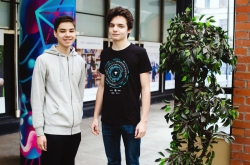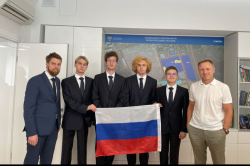Web 4.0 and the neurotechnology revolution: how soon?
Understanding the brain's structure and functioning principles is one of modern science's greatest challenges. Even now, the neurotechnology market stands at 180 billion dollars, and numerous projects on studying the human brain are conducted by different research teams, like the Human Brain Project (Europe), Brain (USA), Brain/MINS (Japan) and others.
As for Russia, everything that has to do with neurotechnologies merges together as part of the National Technology Initiative's Neuronet branch association that aims at the markets of the future. Neuronet was founded in 2015, and since then follows a detailed strategy in developing the neurotechnology market segments. According to the program's ideology, Neuronet is to become the next step in Internet's development (Web 4.0), where new neural interfaces will be used for human-computer interaction.
According to Neuronet's road map, by 2035, there are to be no less than 10 Russian companies in the world's B2B and B2C market segments with a market cap of 70 billion rubles each. The road map's authors outline seven key segments of the neurotechnology market: the CoBrain project, Neurofarm, Neural Medical Equipment, Neuro-education, Neuro-entertainment and Sports, Neurocommunications and Marketing and Neuro-Assistant.
What's the present state of neurotechnology in Russia?
According to data by the Russian Venture Company, neural technologies are already applied in medicine (cochlear implants — electronic devices that restore hearing, bionic prostheses, neural implants for eye's retina, and many more), defense industry, entertainment (neural games for developing cognitive abilities), and education.
One of the most promising segments of this market in Russia is Neural Medical Equipment. For instance, the Neurobotics Company developed a brain-computer interface with augmented reality glasses. The device allows paralyzed patients and bionic sportsmen control exoskeletons using electroencephalograms, i.e. brain waves. The device was tested during the Cybathlon where "cyber-sportsmen" competed: patients with disabilities used brain-computer interfaces to control exoskeletons and wheelchairs.
In the Neuro-entertainment and Sports segment, there already are solutions for both individuals and companies. They include VR brain games and effectiveness improvement systems for both professional sportsmen and amateurs.
Recent inventions are also used in the Neuro-Assistant segment. Such companies as Rostec and Yandex have long been working on data mining systems that make use of deep machine learning. Sergei Shumskiy, head of the Neuro-Assistant subdivision of Neuronet, expects the B2B and B2C sectors of virtual assistants market become a multi-level network of intellectual services by 2035.
"All electronic assistants will be part of a "global office" that will minimize the transaction expenses on searching services, wares, personnel, alignment of personal schedules and interests and such. The tendency will be towards dynamic increase in neuromorphic computational algorithms and architectures," believe Neuronet's experts.
Neuro-education: staying sane while studying
Another promising application of neurotechnology is education. Massive open online courses (MOOC) are already successful, yet in the nearest future the educational process will include the use of neural interfaces, and VR neural helmets will not only be used to study, but will also monitor the user's psycho-emotional condition.
 A robot's insides. Credit: social networks
A robot's insides. Credit: social networks
"We all know of such popular MOOC platforms as edX, Coursera, or the Russian Open Education platform, where millions of people may study without having to leave their homes. Online education's popularity grows with each year, yet there is a problem: as of now, no more than 5% of students successfully complete their education. There are lots of reasons for this: from courses being too simple or too hard to individual characteristics of each student and their potential capability for studying in this manner. Yet, what can be the solution? It might be development of e-education technologies, using new models and methods to using neural interfaces and improving brain's capabilities," adds Lyubov Lisitsyna, head of ITMO's Department of Computer Educational Technologies and scientific advisor of the International Scientific Laboratory of E-Learning Technologies.
Specialists from ITMO University have been modeling neuro-cognitive technologies for several years already. They use special hardware-software complexes that allow researching the main indications of one's functional conditions during e-education, mainly of the brain and the cardiovascular system. All this lets us get information on the student's condition and assess and model educational processes.
Yet, Lyubov Lisitsyna believes that in the future, such technologies will be used not only in research laboratories — we may well get cheap and effective sensors that will allow us to assess one's functional condition in as soon as two years. And that means that the student will get the opportunity to control his workload and make it a lot more effective and safe.
 Bionic prosthesis. Credit: neinvalid.ru
Bionic prosthesis. Credit: neinvalid.ru
Specialists from Neuronet expect the world's neuro-education market segment to stand at 280 billion dollars by 2035. Yet, if the relevance of neural technology and the corresponding market will rapidly grow, who will work in this field?
Where do they train neurotechnology specialists in Russia?
Neural technologies stand at the intersection of psychology, medicine, and technical sciences, so one has to be much more than a good programmer to work in this field. A neurotechnology specialist must know how the central nervous system works, understand the brain's functions and the means to amplifying its capabilities.
Starting with 2017, a program on neurotechnology — Neurotechnologies and Programming — will be taught at ITMO's Department of Computer Educational Technologies. As Lyubov Lisitsyna notes, launching this program is a direct response to the labor market's demand, as it needs programmers who have skills in developing and introducing neurotechnologies. As of now, the program has now counterparts in Russia.
"The infrastructure of projects that have to do with neurotechnologies is still in its development stage. So, if we're talking about educational programs on neurotechnologies and programming, it's still something totally new for Russian education. New programs on neurotechnologies for IT specialists are regularly launched abroad; yet, in Russia there are only a few Master's programs that are more or less related to the subject. As for Bachelor's programs, there are none — which is why we can call our program a pioneering one," shares Ms. Lisitsyna.
 ITMO University. Lyubov Lisitsyna
ITMO University. Lyubov Lisitsyna
What skills will the program train?
The program's first module includes programming on a wide range of languages, as well as different technologies, specifications and program suites. The second module is based on ITMO's research results in what has to do with neurotechnologies and mostly focuses on e-education systems.
"It's all aimed at teaching the students to develop software systems that use neural interfaces and special equipment for solving particular tasks: person identification, defining one's emotional state, developing one's cognitive functions and such, shares Lyubov Lisitsyna. Thus, the program's graduate will not just be a good programmer, but will also have the basic knowledge necessary to become a specialist in developing neural interfaces for electronic systems, including AI technologies, biometry, affective computing and such".
The program's first graduates will be able to apply their knowledge as soon as 2021 — by that time, the demand for such specialists will only grow, states Evgeniy Plujnik, head of Neuronet's Neuro-education subdivision.
"The labor market is still developing in what has to do with neurotechnologies, yet the demand for corresponding specialists will rapidly grow. The nature of the tasks they will be working on is clear, yet a lot will change in specifications and methods. The tasks and goals set by this educational program stay ahead of time, thus, its graduates will definitely have advantages over "pure" programmers," believes the expert.
 Credit: hsto.org
Credit: hsto.org
Analysts from the Markets and Markets international agency also believe in the importance of training specialists in neurotechnologies. Their study shows that one of the key factors that can hinder the growth of neurotechnology market is the lack of qualified technical personnel for creating and operating complex neural interfaces. At the same time, according to forecasts by the Allied Market Research Company, by 2020 neurointerface design will become one of the most knowledge intensive technologies in different fields of professional activity.
Thus, 2017's applicants should keep in mind ITMO's new Bachelor's program Neurotechnologies and Programming of the Department of Computer Educational Technologies.
You can get any additional information on the program on the department's website.





